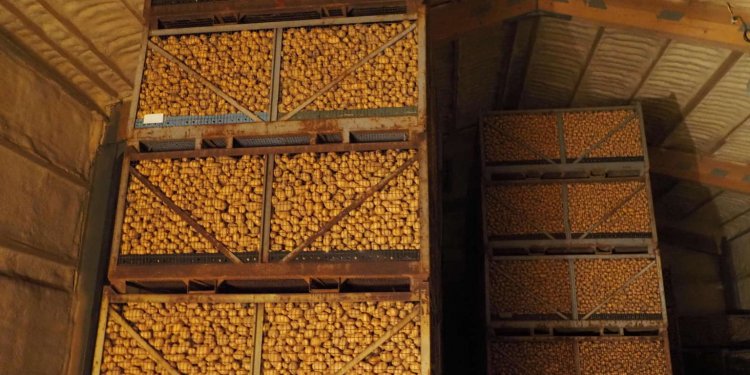The southern Wetterau is a stronghold for organic and conventional potato cultivation. Farmers from Karben and Bad Vilbel are looking forward to a below-average harvest this year. And the Corona crisis is also having an impact on the potato market.
I n the southern Wetterau there are six potato farmers. These include the Rendeler farmer Horst Scheller, the Massenheimer Steffen Laupus and the Klein-Kärber organic farmer Sebastian Mager. The trio agree that potatoes are now almost one of the special crops that require special knowledge for their successful cultivation. “A feeling for the varieties and the soil cultivation is important. Potato cultivation is a passion. If you only have the profit in mind, you should leave your fingers out,” says Steffen Laupus.
He grows 16 different types of potatoes on 90 hectares, mainly solid-boiling ones such as Annabelle and Belana, mainly cooked like Queen Ann, but also floury cooks such as Sunita or Lilly. Always alternating with sugar beet and cereals as well as two hectares of green asparagus. “On our farm, potato cultivation and marketing has increased steadily over the past 20 years. Potatoes used to be a by-product in our farm.
The potato harvest season on the Laupushof lasts from the beginning of July to the beginning of October. For irrigation, the farmer is allowed to take water from the Nidda. The farmer directly markets his potatoes in his own and other farm shops, the catering industry and the food trade. His customers include Edeka, Rewe and Globus.
Export collapses
In order to meet the demand, he buys potatoes from other farms such as the Rendeler Schellerhof. The edible potatoes are packed in three sorts, washed or unwashed, in 1.5 kg to 25 kg nets. With cooling at five degrees 1500 tons and without cooling 1000 tons are stored in 1500 kilogram scorates each. Three employees harvest the potatoes, others help with the packaging and two trainees with the storage.
For generations, the Scheller family in Rendel has been one of the potato farmers in the Wetterau. Grandpa Albert and father Günter Scheller delivered their potatoes directly to the cellars of their customers in Frankfurt in the autumn. On a total of 120 hectares in Rendel and the surrounding area, Horst Scheller grows on 35 hectares of edible potatoes such as Annabelle and Anuschka or salad potatoes such as Glorietta or Allianz, alternating with sugar beet, wheat, soybeans (20 hectares) and biogas maize for the karben plant. There are four sortings of each potato variety. “Oversizes and small ones go into gastronomy, medium to private individuals, salad sorting into gastronomy and private individuals.
In the European food industry, varieties such as Zorba and Innovator are processed into fries, chips such as Lady Rosetta and Austin. Scheller’s customers include the large potato trader Weuthen, the freshness centre in Kalbach as well as direct marketers in farm shops and street sales.
“The market for industrial potatoes is difficult because exports have collapsed,” says Scheller. Thanks to foil cultivation and irrigation, new potatoes will be available as early as 10 June. The water for irrigation comes from Brunnen with the permission of the Wetteraukreis and from Nidda and Nidder with the permission of the President of the Government in Darmstadt. “On the rainy areas, the average harvest was 40 to 50 tonnes per hectare. Without irrigation, it is 10 to 15 tons less,” reports Horst Scheller.
He stores around 500 tons of potatoes in large wooden boxes. For this purpose, it uses cooling at five or six degrees, and fumigation with the organic agent “1.4 Sight” on the other. “The substance of the product is also present in the potato, where it regulates germination.”
Sales in gastronomy are missing
Today, farmers are required to have a great deal of expertise in all areas, and the bureaucratic burden is high. “You need an office worker for certification alone.”
Organic farmer Sebastian Mager grows nine varieties of potatoes on ten hectares. These include the cooked Nicola and Belana, the predominantly solid-boiling finca and the red-shelled Laura as well as the floury cooking Gunda and Talent. Always alternating with spelt, wheat and rye. Harvesting starts in July.
250 tons are stored at five degrees using a refrigeration machine and at night with outdoor air. The potato is marketed in-house and other farm shops and at weekly markets in the Rhine-Main area. Due to the drought, the harvest is rather below average. A small part of the fields was irrigated with well water. Like his colleagues, he reports that more farms have entered potato cultivation.
As sales in the catering industry were lacking due to the Corona crisis, huge quantities were squeezed into the market and prices, which could be better due to the harvest volumes. “Over the past two years, prices have been adequate, this year the price is also falling by newcomers,” adds Laupus. The entrepreneurial risk in organic and conventional agriculture is high due to climate change and market fluctuations.
Potatoes are crops from the nightshade family. To the delight of the many lovers of great tubers, it is estimated that there are about 5000 varieties worldwide. In Germany, about 200 varieties are approved by the Federal Variety Office. Depending on the variety, they are classified in early, medium-early or late. Their properties are also different, ranging from floury to predominantly solid-boiling to solid-boiling. Potatoes are grown both as food and feed and as an industrial raw material. Cf





